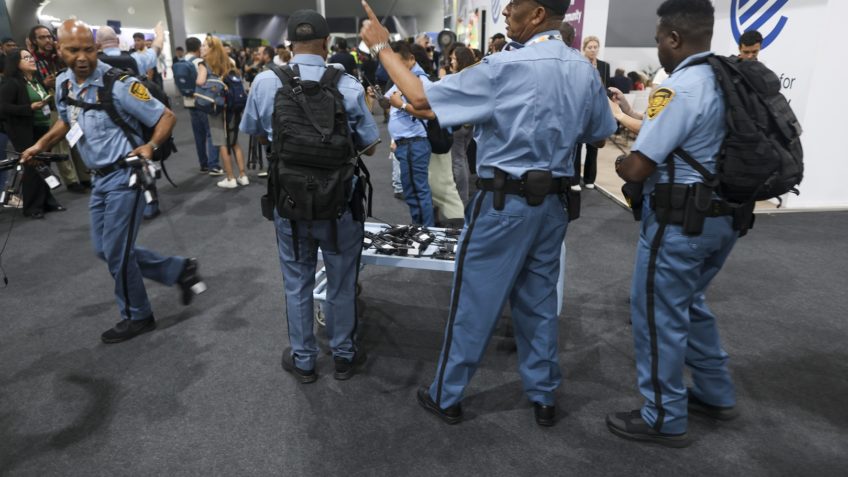Tensions Rise at COP30: Protesters Challenge Access to the Blue Zone
On November 11, 2025, a significant confrontation occurred at the 30th United Nations Conference on Climate Change (COP30) in Belém, Brazil. This incident involved a group of approximately 50 protesters attempting to breach the Blue Zone, a restricted area designated for diplomats and accredited press. The clash was reported by various international news outlets, highlighting the ongoing tensions between climate policy, indigenous rights, and environmental activism.
A Confrontation with Security
The protest escalated as participants from the Global Health and Climate March distanced themselves from the main demonstration. They made their way towards the Blue Zone entrance, prompting intervention from security personnel. According to reports from media outlets like Poder360, some protesters were identified as members of the Tapajós indigenous community, alongside members of the Juntos collective, affiliated with the Psol political party. Utilizing social media, many labeled the incident #OccupyCOP, emphasizing their tactic of making a stand for indigenous representation.
Witnesses reported that two security guards incurred minor injuries during the scuffle, and there was some damage to the surrounding area. Following the incident, uniformed officers from the local Fire Department established a blockade at the entrance to prevent further access.
Voices of the Protesters
The motivation behind the protest was articulated by various individuals within the crowd. A representative from CNN spoke with Gilmar, an indigenous leader of the Tupinambá people. He passionately stated, “We can’t eat money. We want our lands free from agribusiness, oil exploration, miners, and illegal loggers.” His words underscored the deep-seated concerns that many indigenous people have regarding environmental degradation driven by corporate interests.
Helen Cristine, a voice from the Juntos movement, pointedly criticized ongoing oil exploration projects, particularly in the Equatorial Margin. She argued that COP30 primarily served business interests rather than the needs of indigenous peoples, declaring, “The organization is aimed at businesspeople. Oil exploration is destroying the environment.”
Media Coverage and Reactions
The incident drew considerable attention from the international media. Outlets like The Guardian and The Washington Post reported the protesters’ demand for a more inclusive dialogue at the conference, noting that some chants included phrases like “They can’t decide for us without us,” highlighting the urgent need for indigenous voices in climate negotiations.
The Washington Post further recounted remarks from Augustin Ocaña, a youth mobilization coordinator, who underscored how indigenous participation remains fraught with complications at events like COP30.
Portuguese publication Publico noted that, following the chaos, several scheduled events for the second day of COP30 were abruptly canceled, illustrating the broader impact of such protests on climate discussions.
Security Measures Post-Incident
In the aftermath of the protest, reports indicated that security measures were heightened. The World, a French news outlet, conveyed how calm was restored, but not before security reinforced barriers to the Blue Zone with furniture and tables, effectively sealing off the area from potential future disruptions.
An eyewitness from UFPA (the Federal University of Pará), professor João Santiago, reflected on the situation, articulating that the indigenous movement sought to communicate their demands but faced systemic barriers to entry.
The Underlying Issues
The events at COP30 spotlight the intricacies of climate diplomacy, where indigenous rights are often overshadowed by economic interests. As activists continue to express their frustrations, the challenge becomes not only about addressing environmental concerns but also about ensuring that marginalized voices are included in the dialogue.
With indigenous communities being some of the most affected by climate change, their participation in discussions about policy change is vital. As the COP30 continues, the question remains: How can the UN ensure that all stakeholders, especially the Indigenous peoples, have a seat at the table?
The recent events at COP30 serve as a reminder of the urgent need for a more equitable approach to climate action, one that respects the rights and voices of those who have traditionally been excluded.



